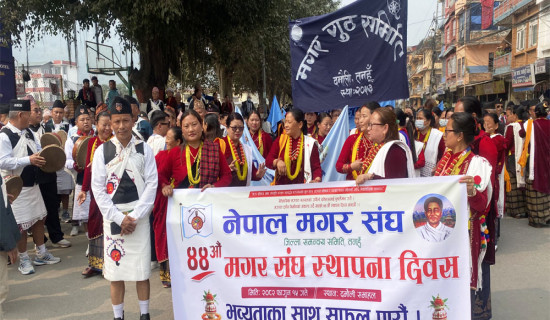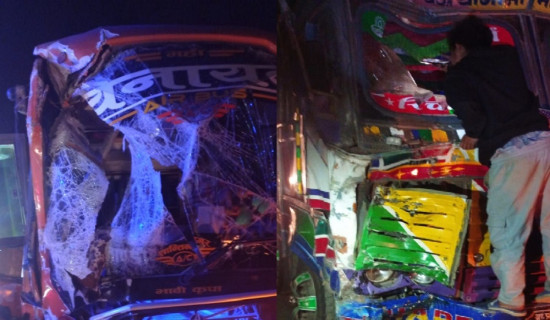- Saturday, 28 February 2026
Perspective On Nepali Women's Journey
The roles and status of women in Nepal have undergone a massive transformation as their rights have been secured by the Nepalese constitution and probably due to an increment in literacy rate. Before the enforcement of legislation abolishing the cruel custom of sati pratha in 1920 by Chandra Shamsher, many innocent women were forced to sacrifice their lives in the burning funeral pyre of their husbands.
It is said that this act of burning an alive woman was at its apex in the Medieval period. This extreme form of violence was considered one of the glorious acts to sanctify women. Where the husband could remarry within a few days after the death of his wife; the wife had no option to live after her husband’s demise. Probably it was not just the religious prejudice rather women too might use it to scare off insults and slights, and curtailment of freedoms associated with dress code, diet, and social relationships to which they were subjected daily.
Good Wife
“Sati” appears in Sanskrit text which is synonymous with a good wife. Though this act of throwing own self into their husband's pyre and burning to death was considered a symbol of the great women, later this so-called heroic practice turned into a forced practice with a dark history. To muffle the sound of the women’s screams in a burning fire loud instruments were played. This infinite pain that women suffered in our country was no longer a century back.
When we look back to this fearful history of ours, we can predict how the dominant ideology of Hindu culture was being practiced. Now to this date, a lot of progress in various dimensions has been made. We could see female participation being increased in the economy, leadership, and every other area. This progress is a hope that women tomorrow will be less tolerant of inequality and injustice than in past generations. However, the empowerment of women in Nepal is inextricably bound to dominant social culture which assigns women to be involved only in household and family responsibilities.
In Nepalese culture, the household activities are to be performed only by females. The saddest part is that women also harm each other passively by accepting the attitudes of society. For instance, a mother never wants to see her son assisting her daughter-in-law with household tasks. Instead of growing together, every house ends up with a fight between the daughter in laws and mother-in-law. This passive acceptance of the limited role to play in society makes them difficult to envision the broader world. As a result, they confine themselves to slavery away for their male family members.
If we observe deeply, the women of so-called higher castes, have been more suppressed as these women enjoy much less freedom than women of other communities. Being dominated by the ideology of Nepalese culture, social and religious patterns women still have no autonomy in the private sphere and enjoy only limited positions in public. It is challenging for women to envision themselves as leaders or in a better position than male even with the same qualification.
Our social pattern of culture is such that even females working outside and economically sound are bound to give more time to their family life. This makes them difficult to balance their family life and career.
Being in patrilocal residence for Nepalese females, a great sacrifice is to be made to look after their family system which impacts their ability to devote time and energy to think big. Married women in patrilocal households in Nepal enjoy limited freedom. While joining their laws at home; most women are expected a lot to serve in-laws and male members. This does not end here. Every responsibility related to the household is automatically transferred to her.
There are only duties for her to perform and are consistently judged for all her actions. Surprisingly, only women have a responsibility towards their in-laws but for a husband, there are no duties to perform for the woman's parents. The list of inequality goes on and on. This gender inequality has been a source of discontent for many women and is the reason for unhappy marriages and broken homes.
The saddest reality to accept is that Nepalese women work far more than men spending about 25 to 50 % of their time on household tasks. Even with the immense work they perform women’s economic participation remains unaccountable. Our flawed definition of the economy contributes female invisible. The sector they cover which includes caring for their children caring for the elderly all the household tasks, and collecting fuel and fodder, unfortunately, fall outside the accounting system of the country.
Without these activities being performed no male members can become well-being; and can contribute to their best in various other dimensions. Still, women's role and their contribution to staying at home are inconsiderable in Nepalese society.
Violent Culture
A child brought up with a mindset of superiority and egoism of being male often leads to a destructive lifestyle between genders. This violent culture can be seen in the marital aspect of our society. When a child is brought up with a sick mentality of gender discrimination, he definitely, can never sow the seeds of equality in relations. As a result, a vicious cycle of violence begins which harms every aspect of quality life. This is what we can see in many homes of our country despite the profession they carry.
The most hazardous part of Nepalese culture is that in every home with the passive acceptance of societal attitudes, women themselves within the family tend to destroy each other.
However, this journey of women from extreme violence to role models in today’s technology would help confront gender disparity. For this, parents should choose to raise their children to know their inner self.
They should be taught to treat every being compassionately. The dogma of the male role being superior in possession of power and economic privilege should not be kept alive.
(Dahal is a pharmacist)









-original-thumb.jpg)







